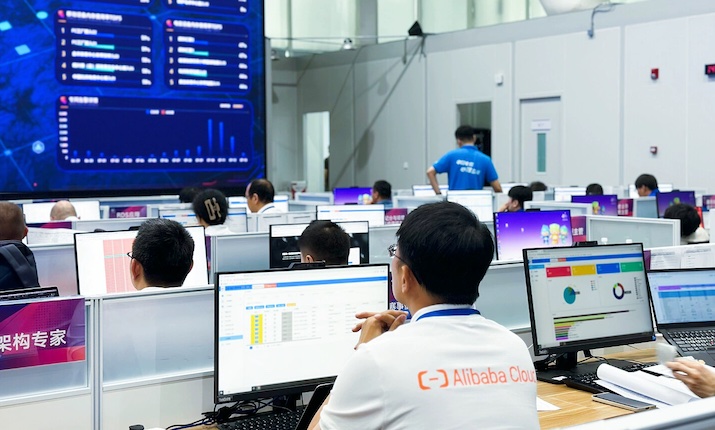First Asian Games core systems to be hosted on Alibaba Cloud

In a mission to accelerate the digitalisation of the Asian Games, the Hangzhou Asian Games Organizing Committee (HAGOC) has launched its core systems on Alibaba Cloud, the digital technology and intelligence backbone of Alibaba Group. Alibaba Cloud’s technologies will support the first Asian Games on the cloud, to facilitate a more intelligent, sustainable, sophisticated and efficient Asian Games – to be held in Hangzhou from 23 September to 8 October.
The core systems, comprising games management systems, results distribution systems and games support systems, will support around-the-clock operations of 56 competition venues and other critical facilities, such as the information technology management centre, main media centre and the Hangzhou Asian Games Villages, serving more than 100,000 registered users, including athletes, broadcasters, journalists, staff and volunteers from 45 countries and regions across the globe.
As the Games’ official information technology integrator and cloud service provider, Alibaba Cloud is responsible for running an all-on-cloud Asian Games, leveraging its proven track record in supporting large-scale worldwide sports events.
Selina Yuan, president of international business, Alibaba Cloud Intelligence Group, said: “We have extensive experience supporting large-scale global sports events building upon our proven cloud technologies and trusted services. We are proud and excited to return to our headquarters this year to help deliver an innovative, efficient, sustainable and inclusive Asian Games in Hangzhou. With the even more advanced core systems support, we are committed to an effective collaboration with the Games’ stakeholders, and with further improved cloud broadcast technologies, we will bring more engaging viewing experience to the global audience and sport fans.”
“The Hangzhou Asian Games will be another milestone for Alibaba Cloud to show how robust, scalable and secure cloud computing technologies can help drive digital transformation of large-scale sports events to bring sports and entertainment to every corner of the world,” Yuan added.
Alibaba Cloud provides the fundamental architecture that supports the seamless integration of the core systems as well as intelligent applications such as cloud broadcasting and event organisation and communications.
For example, at the end of each competition the results distribution system will receive data from the timing and scoring system at the venue, which will be further integrated into the central system for distribution in different formats through different application programming interfaces (APIs), such as the results display and news feeds. All of these are built on the Alibaba Cloud to ensure efficient, accurate and stable results distributions.
Using cloud-native technology and running it on Alibaba Cloud’s container services, the company enables more agile, scalable and efficient operations of the event. In addition, there is no longer a need for physical data centres that require large, dedicated space and maintenance facilities to run. Cloud resources will be released once the event is concluded, making the games more environmentally friendly.
The Hangzhou Asian Games will also be the first in the games’ history during which rights-holding broadcasters (RHBs) will receive live footage through public cloud infrastructure. Alibaba Cloud expects to transmit more than 5,000 hours of live footage through as many as 68 high-definition and ultra-high-definition feeds during the event. In addition to live broadcast, the cloud-based content platform delivers footage in HD or UHD, highlights of the Games and news flashes for RHBs to present to the audience’s mobile or other devices.
During the Games, the cloud broadcasting will transcend physical boundaries and bring the excitement to audiences across Asia and the rest of the world, through Alibaba Cloud’s infrastructure and services in Hangzhou to ApsaraVideo Live Centers in Shanghai and Beijing as well as regional cloud resources in Hong Kong Special Administrative Region (SAR) and Singapore.
The Hangzhou Asian Games has also launched an Intelligent Operation Platform to manage the operation of the three Asian Games Villages, which is expected to host over 20,000 athletes, reporters and officials. The platform leverages Alibaba Cloud’s advanced visualisation tool to analyse real-time intelligence to further streamline the management system, while providing a more seamless user experience for those who live in the villages.
For example, Alibaba Cloud’s solution utilises real-time information to analyse traffic and crowd management. A warning will be provided on a dashboard if a public area gets too crowded for public safety. Extreme weather, power failure and fire warnings are also available for organiser’s intelligence-driven decisions.
With Alibaba Cloud’s natural language processing (NLP) technology, an intelligent service robot will also provide all-day online consulting services in both English and Chinese for people living in the Asian Games Villages through a web application service. The chatbot can provide real-time responses related to the services available in the villages.

